MUKURUKURU MEDIA
Backyard agroecology gardens bring relief to starving Limpopo villages
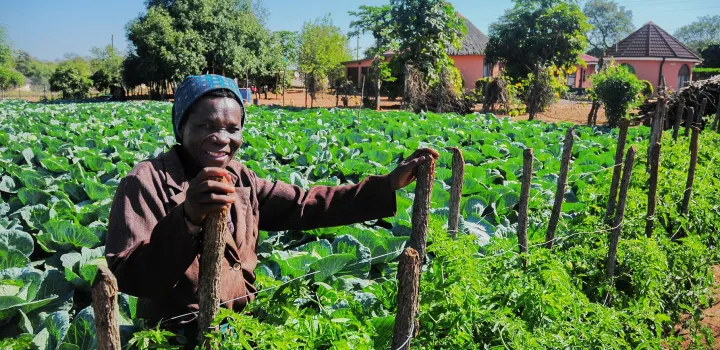
Rural residents are looking to indigenous farming methods to keep hunger away. Holistic and integrated interventions by backyard farmers in Limpopo have made a major difference in villages like Phalaubeni, which are located far away from major trading centres.
The backyard garden in Mamaela Mathebula’s homestead stands out in the drab and dull surroundings of Phalaubeni village in northeastern Limpopo.
Neat rows of well-tended cabbages, beetroot, chillies, onion and other vegetables thrive on a patch of land about a hectare behind the homestead comprising a house and two rondavels.
It is an arresting sight, completely different from other backyards where residents only plant maize during the rainy season and leave the dry maize stalks to reflect the dire state of affairs in the villages during winter.
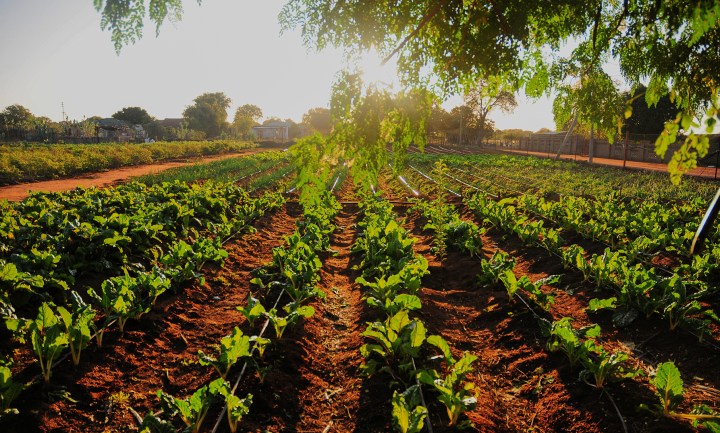
Tintswalo Malina Rikhotso started gardening on a small scale but has now grown to become a major supplier of vegetables in Makhuva village, Limpopo. (Photo: Lucas Ledwaba/Mukurukuru Media)Media
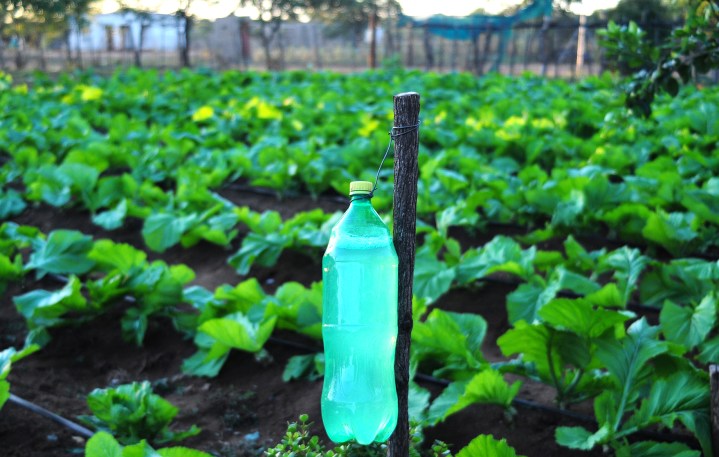
Backyard farmers in Limpopo have learnt to make their pest repellants using organic material. (Photo: Lucas Ledwaba/Mukurukuru Media)
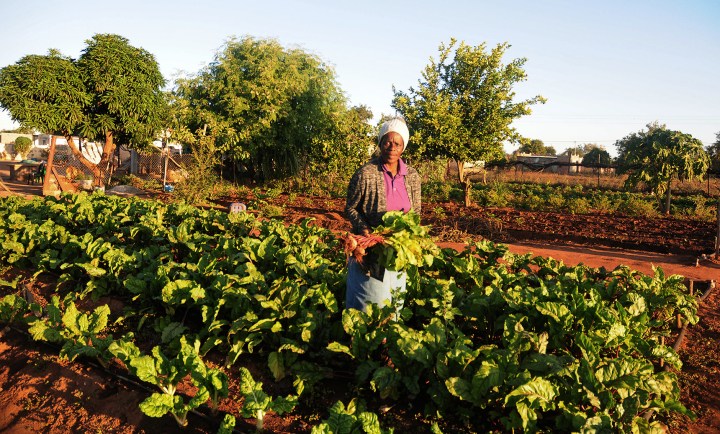
Tintswalo Malina Rikhotso started gardening on a small scale but has now grown to become a major supplier of vegetables in Makhuva village, Limpopo.
(Photo: Lucas Ledwaba/Mukurukuru Media)
Mathebula is part of a network of more than 100 women and men in poverty-stricken villages in the Greater Giyani local municipality who are involved in a pioneering backyard gardening agroecology project.
The project was started by local social activists Butshabelo Mabunda and Connie Mbodi in a bid to address issues of food security and acute food shortage in the villages.
They spend their days traveling by taxi or catching lifts with strangers on the backs of bakkies to far-flung villages, helping residents to start their own backyard gardens and teaching them about agroecology.
“We are teaching people to farm with the resources they have. We don’t want people to stop farming because they don’t have money to buy chemicals and other material,” says Mabunda, who has travelled extensively abroad to learn the intricacies of agroecology and social activism.
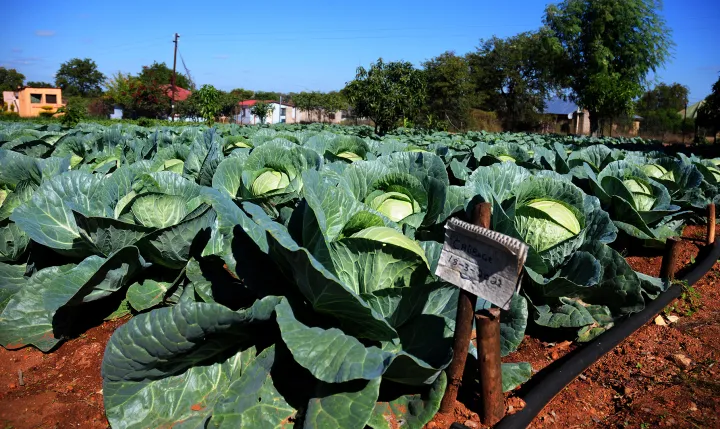
Cabbages grown using only organic methods thrive on Mamaela Mathebula’s farm in Phalaubeni village in Limpopo. (Photo: Lucas Ledwaba/Mukurukuru Media)
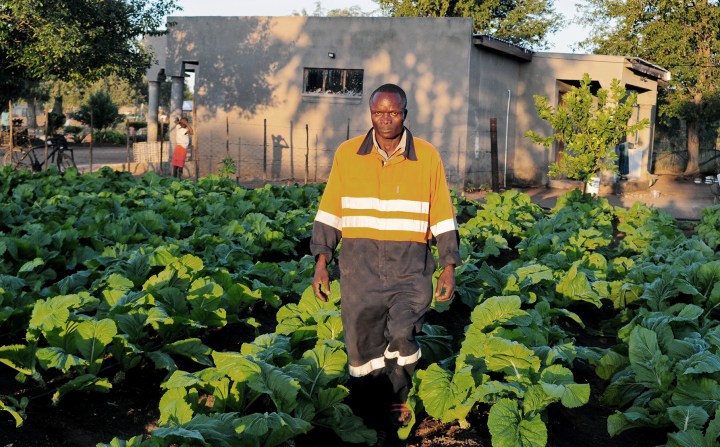
Retrenched mineworker Joshua Rikhotso has joined the network of agro ecology backyard gardeners in Lipopo, who are making a living from their produce.
(Photo: Lucas Ledwaba/Mukurukuru Media)
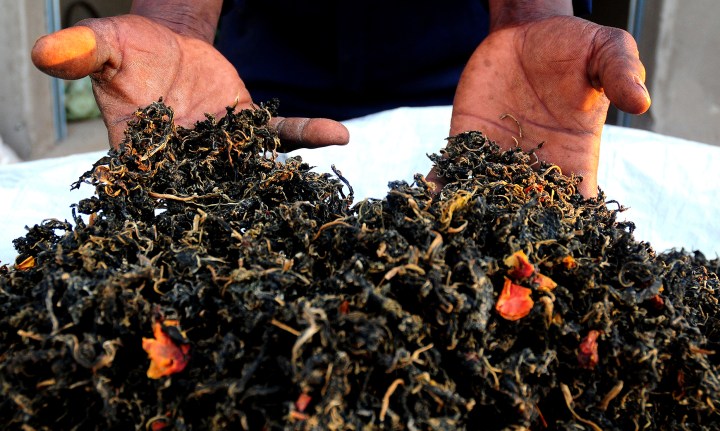
The organic food produced in the backyard gardens in Limpopo include spinach which has rich nutritional value. (Photo: Lucas Ledwaba/Mukurukuru Media)
The Food and Agriculture Organisation of the United Nations (FAO) describes agroecology as “a holistic and integrated approach that simultaneously applies ecological and social concepts and principles to the design and management of sustainable agriculture and food systems”.
FAO says agroecology brings solutions to multiple Sustainable Development Goals which include zero hunger, food security, nutrition and health; poverty alleviation, climate change resilience and biodiversity among others.
Mabunda says they started the project in 2016 after undergoing training with a Gauteng-based organisation. The biggest challenge they face so far is a lack of funding. The pair believes that with funding and resources to build and equip a training centre they could reach even more people.
“We are saying let us go back to how it was done in the olden days, how our grandparents used to farm,” says Mabunda.
The process focuses on organic farming methods which include the use of plant material and animal waste to produce pest repellents and fertilizer.

Connie Mbodi in yellow discusses farming methods with Mamaela Mathebula in her backyard garden., Limpopo. (Photo: Lucas Ledwaba/Mukurukuru Media)
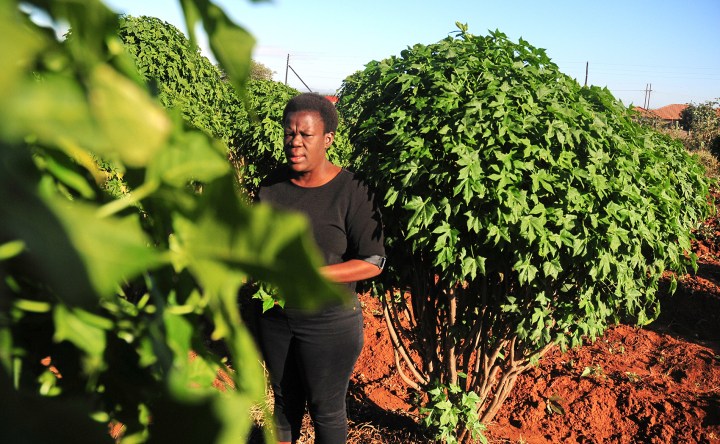
Agro ecologist and social activist Butshabelo Mabunda’s garden in Limpopo boasts more than 60 plants of chaya ( Cnidoscolus aconitifolius) ) trees which is used as a food supplement and medicine. (Photo: Lucas Ledwaba/Mukurukuru Media)

The backyard farmers in Limpopo adhere to a strict seed storage and preservation system. They also share seeds which includes black beans to brew coffee. (Photo: Lucas Ledwaba/Mukurukuru Media)
With access to a reliable water supply being a major challenge for many households in rural areas, the farmers apply mulching using shrubs and grass between the plants to preserve moisture in the soil.
They have also developed various methods of rain water harvesting, storage and recycling to help with irrigation.
“In organic farming we don’t throw away anything. We focus on ensuring that everything is preserved and recycled for the benefit of our crops,” says Mbodi.
They build compost piles to produce organic fertilizer and brew their own pest repellent using a combination of leaves, chicken droppings and cow dung. The network of backyard farmers also engages in seed production and storage.
“We share seeds among ourselves. We encourage each other to produce our own organic seeds. We are showing people that you do not need money to start farming. Everything we have, we produce ourselves,” says Mbodi.
Some of the backyard farmers, like Tintswalo Rikhotso of Makhuva village, also engage in pig and chicken farming. The soil from the piggery and chicken coops comes in handy in the production of fertilizer.
Rikhotso, who used to have just a small garden, now boasts a field as impressive as Mathebula’s. She has also taught her son, retrenched mineworker Joshua Rikhotso, the finer details of organic farming. He too runs a backyard garden and sells his produce to locals from the back of his bicycle.
Their produce, which includes indigenous herbal remedies such as umhlonyane [African wormwood] which was in high demand during the Covid-19 lockdown, is sold to locals at low prices and some is given away to indigent families or donated to the bereaved during funerals.
Mathebula says before she was introduced to the project she was planting vegetables on a small scale just for her family’s consumption. But now she is the village’s main vegetable supplier.
“I started farming seriously about three years ago after meeting Connie [Mbodi]. Before that I thought you need a lot of money to start something like this,” she says, pointing to the impressive crops around her.
“People are really hungry and poor here. They come to buy from me, but I often give away vegetables for free or in exchange for a little money just so people can eat,” says Mathebula.
Mbodi says interventions by backyard farmers like Mathebula have made a major difference in villages like Phalaubeni which are located far away from major trading centres.
The town of Giyani, about 60km from Phalaubeni is the only semi-urban area in the region, which has approximately 97 rural villages. In its final Integrated Development Plan 2020/21, the municipality notes that there is a high level of low-earning people which may be in relation to industry demographics in the area. “Agriculture in general employs more people, but with lower wages. People who are earning higher incomes are professionals who are usually fewer in number.”
A return taxi trip to Giyani costs R76 from Phalaubeni, and with the low rate of travellers, such a trip may take hours as taxis wait to fill up with passengers along the way.
“People no longer have to travel to town to buy cabbage. They can get vegetables right here in the village. Many people here rely on government social grants. Parting with R100 has a huge impact on their survival,” says Mbodi.
The 2022 Global Report on Food Crises noted that levels of hunger remain alarmingly high and that last year they surpassed all previous records with close to 193 million people acutely food insecure and in need of urgent assistance across 53 countries/territories.
In South Africa a report by Statistics South Africa titled Measuring Food Security in South Africa: Applying the Food Insecurity Experience Scale, revealed that nearly 23,6 percent of South Africans in 2020 were affected by moderate to severe food insecurity, while almost 14,9% experienced severe food insecurity.
“Food prices are very high. People are starving in the villages because there are no jobs. But if we encourage more of this [backyard gardening] then we will definitely impact food security in these areas,” says Mbodi. DM/MC/Mukurukuru Media






















 Become an Insider
Become an Insider
How does one get in touch with them?
I’d also like to know that
I spoke to Butshabelo. She can be reached at 082 298 6020, or at butshabelom at yahoo dot com. They have been doing this work (from Giyani) privately, but post the article, they were advised to form an NGO and are setting it up. Their immediate goal is to start a nursery to generate income and provide beneficiaries with plants, and they need seeds, seedling trays, shade nets etc. They have data constraints and thus do not see the Maverick or any comments, but she was very appreciative of the message of support.
What an uplifting article. Butshabelo Mabunda and Connie Mbodi should be proud of what they have done. Hopefully in the future , when you write a follow up article on the growth of this project, you will not have to describe the villages of the Greater Giyani local Municipality as poverty-stricken. Food and nourishment with a modest income leads to more ideas and more action. Modest prosperity and wellness is what we all seek. Looking forward to reading about other projects around the country.